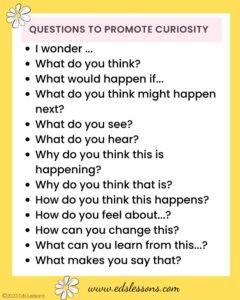How to facilitate learning with questions
As inquiry educators our job is not to answer questions, in fact it’s not important to even know the answers to questions. Our job is to facilitate the finding out of answers to questions.
As facilitators, our job is to encourage children to ask questions and to become problem solvers. So often we just want someone to give us the answers, without doing the work. Although this is a quick solution, it’s not what real education is about. Education is about learning, and when someone just gives you the answer, you’ve learnt nothing!
Very young children always asked the perfect question. Why? Why indeed? The trick is not to answer that question, but to ask them what they think instead, and then help them explore options to find the answers to their questions.
As children progress through school, they slowly appear to lose that curiosity and stop asking why. Our job is to ensure they start asking questions again. As all good teachers do, the first step is teaching kids explicitly what good questions look like. Even this in itself could be the subject of an inquiry project. What are the characteristics of good questions?
What questions should we be asking?
Asking simple closed questions, give us very little insight and usually don’t require deeper thinking. We need to be asking questions that encourage deep thinking and wondering.
Those why questions are a great start. Why is the sky blue? Why do trees lose their leaves? Why are there seasons? Why are questions important? What a great starting point for any inquiry project. Just imagine the possibilities and lines of inquiry.
How questions also get us thinking. How do birds build their nests? How are cars made? How does water get into our taps? How does electricity work?
What if questions are great for stimulating creative thinking and wondering. What if there was no school, how would we learn? What if the sun never shined? What if there was no gravity? What if everyone stopped following rules? What would happen if we never used technology?
I wonder questions are another great catalyst for creative thinking and problem solving. I wonder why geese fly in a V shape? I wonder why the ocean is blue? I wonder why snails have shells? I wonder why the leaves change colour in autumn?
Who and when questions are necessary, but often don’t require deep thinking, because the answers can be found easily. Who invented electricity? When was the lightbulb invented?
As a quick reminder of the types of questions to ask, download this quick guide and put it somewhere as a reminder and refer to regularly. Click on the image to download.


 vigna
vigna 









